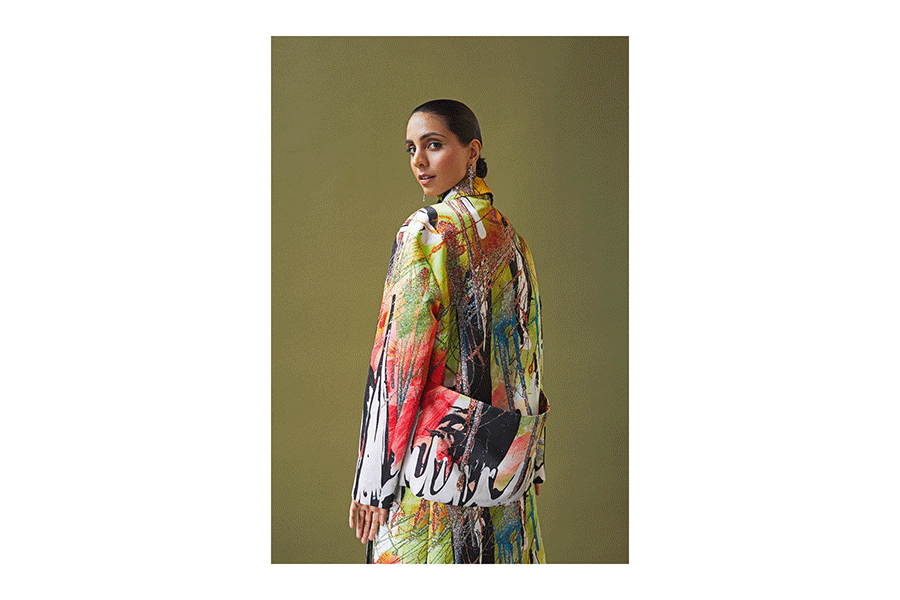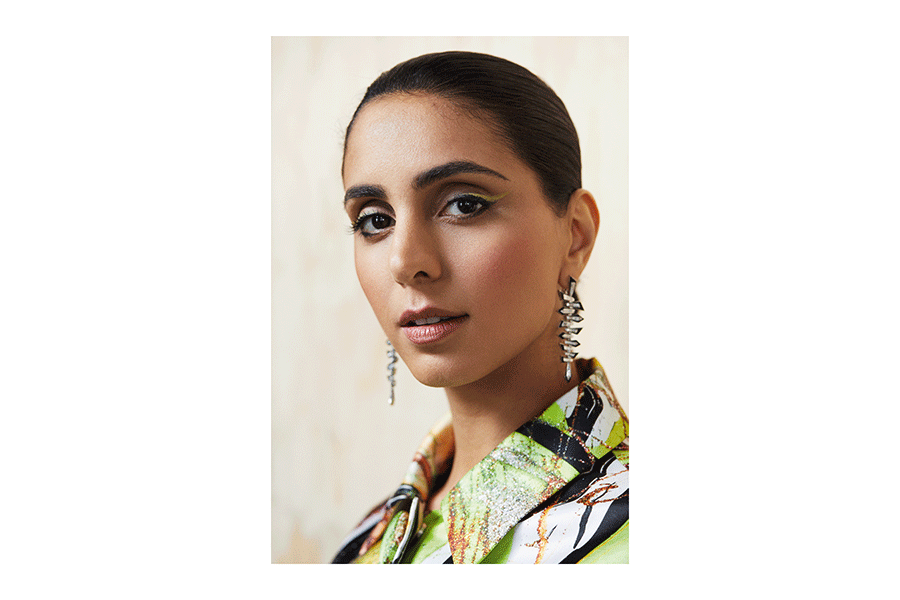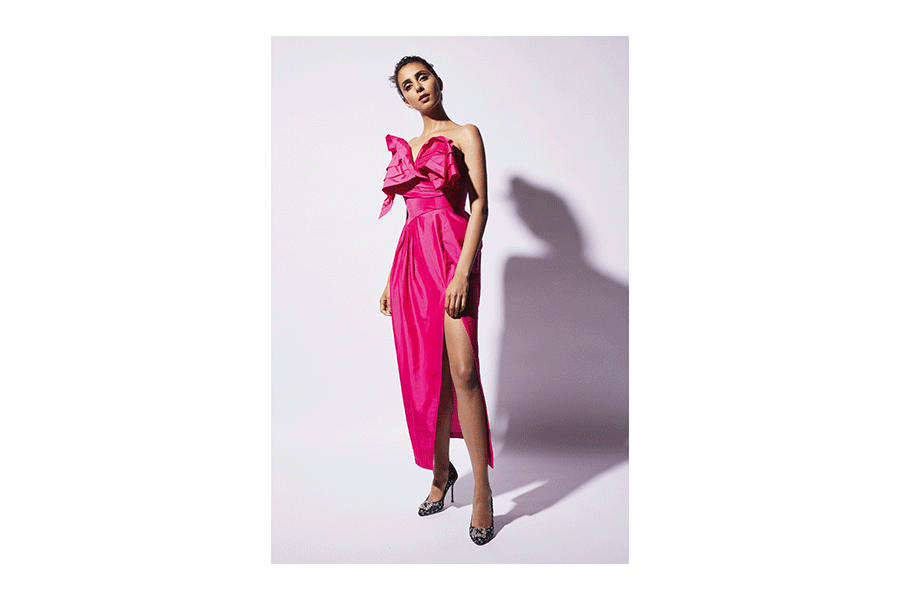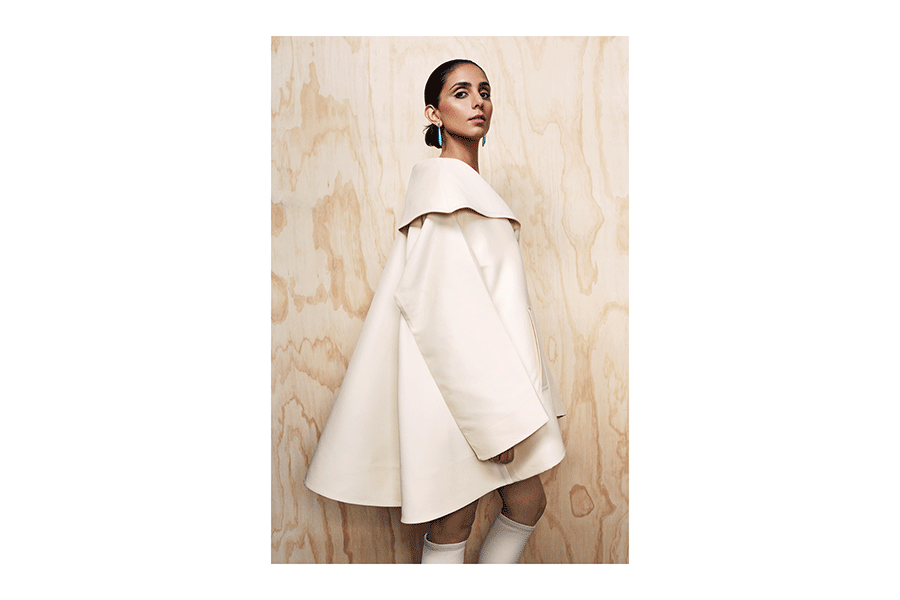Ahead of her new series, The Lazarus Project, Anjli Mohindra talks funny facial expressions, dealing with rejection and embracing the silver-linings of lockdown.
Photography by David Reiss | Styling by Olga Timofejeva | Hair by Shukeel Murtaza | Make up by Charlotte Yeomans
I am starting to realise that sci-fi is a really good way of asking heavily moral questions about humanity,” Anjli Mohindra tells me when we sit down to talk about her latest role, that of Archie in Joe Barton’s The Lazarus Project for Sky Max. “I suppose because it is set in another world, or a parallel time, it can really get deep into the questions about why we exist; does altruism exist; is anybody truly all good… ?”
Sky describes the show, which comes out this month, as “a riveting series that speaks directly to our uncertain times and to our desire to take charge of what is beyond our control.” It tells the story of George, played by Paapa Essiedu, who is convinced he has lost his mind when he begins repeatedly reliving a day from his past, until he meets the mysterious Archie, who recruits him into a secret organisation that has the power to turn back time if the world is threatened by extinction. Known as the Lazarus Project, the group are desperately trying to stop a criminal who is hellbent on detonating a nuclear warhead and destroying the planet.
“I am a huge Joe Barton fan, I really loved his last major series, Giri/Haji, so when the script came through for this, I already felt a huge amount of excitement to have my hands on it,” Anjli says, explaining the appeal of the project. “The cast as well… it is so brilliant when you are excited by the material, but also the team around you. So, we had Paapa Essiedu, Caroline Quentin, a brilliant actress called Salóme Gunnarsdóttir, Lorn Macdonald, and Rudi Dharmalingam and Charly Clive, I mean the list just goes on…”

“Archie is George’s mentor, and she is just a delight to play. She is like a human grenade,” Anjli reveals of her character. “She just kind of sprung off the page. I learnt a lot from her about resilience and about social masks, and about how people can be in an awful lot of emotional pain, and yet still have this vibrancy, and this pull of humour and infectious fun. She is really such a brilliant, rounded character and was just an absolute joy to delve into.”
Having watched a sneak preview of the finished show, Anjli is excited to see the response it receives from viewers. “I think they have done such a brilliant job of making it look like a Hollywood blockbuster; it looks great,” she tells me, excitedly. “It is really just the kind of show that I would love to watch. And that comes with great pressure, because you don’t want to screw it up… But, yeah, watching it was a real skin tingling moment!”
Like many actors, Anjli admits that she feels conflicted when it comes to watching her work. “Do you know, it is such a two-sided feeling,” she explains, “because there is a real excitement to see how it all came together, and what other people brought to it, and whether what you did worked. Acting is so weird – it is one of those few art forms where you are the painter and also the canvas. So, you can’t stand back from it the minute you have created a scene and see how it has turned out. I mean, there is something quite liberating about that, but there is always a curiosity to see how it came together. I also find it excruciating, because I just hate the things that my face does and desperately wish that I could change it, but months have passed, and it is now immortalised on screen!” she laughs.
Others clearly do not feel the same way about Anjli’s face. When she appeared as jihadi Nadia in the BBC’s Bodyguard in 2018, The Guardian wrote of her performance: “Full credit in particular to Anjli Mohindra, who played Nadia and who managed to say so much with her eyes throughout the series. From the terrified naivety she presented at the start, to the calculated zealotry she revealed at the end.” Though not her first major role, it marked a pivotal moment in her career, and is perhaps the one for which she is best known. Since then, her diverse CV has included quirky police drama Wild Bill with Rob Lowe, Netflix film Munich: The Edge of War and, most recently, medical officer Tiffany Docherty in the BBC drama Vigil.

Next up after The Lazarus Project is a role in The Suspect, on ITV later this year. A gripping psychological thriller about a murder investigation, Anjli explains that the story is particularly poignant at this time. “It just felt very close to reality in many ways, because of the tragic cases of Sarah Everard and Sabina Nessa. Having a series about the murder of a young woman in London felt very strange and sad, but important, I think.”
She plays DS Riya Devi, one of the team assigned to investigate the case. “Riya is… you wouldn’t say kickass for a guy, would you? I wish that wasn’t the word. A real hot shot, go-getting policewoman, who doesn’t necessarily want to be in murder, but has found herself there,” Anjli reveals. “And yeah, she is not a pushover, and she is not afraid to shout up the ranks to get herself heard. And I really respected that about her. Because she is a flawed character, like most of us are, and sometimes she gets it bang on, and sometimes she gets it wrong, and I think that is always quite interesting to play.”
Another strong, determined character – is there a theme when it comes to the roles she is drawn to? “Yes, strength of character,” she agrees. “But I think sometimes that strength can be encased by a lot of vulnerability in a character, so also, flawed characters. As I am getting more experienced, I am realising that that is where the real fun is. You know, not necessarily likeable people!”
Of course, falling in love with a character on the page is no guarantee of a part. I wonder how Anjli deals with the inevitable rejections that come with auditioning, especially for those roles she has set her heart on. “I don’t think the pain of rejection gets any easier, especially when it means so much,” she admits. “I am starting to learn, though I am not so good at applying it myself, that if the life that you have outside acting is rich and fills you with joy, then when you don’t get a job, if you can throw yourself back into the other things in your life that you love, it somehow gets a little bit easier… But it does hurt; sometimes I find myself grieving the characters that I didn’t get to play, because that version of them will not exist now, someone else will bring another version of them to life, and I feel sad that my version won’t get to live out a full realisation.”

How does she go about realising the characters of the parts she does get? “I read the script as many times as I can, and then ask myself lots of questions about who they are,” she explains. “So, I try to work out what their flaws are, what they are running away from. And I do love that classic thing of writing a character biography, because I think that our childhood experiences massively shape who we are. I think that stuff really helps me to steep myself in a part. I read once that Meryl Streep always invents a secret that she imbues her characters with. She doesn’t tell anybody; it is just something that the character is trying to hide or run away from. And I think that is just such a brilliant thing. Because we are all trying to hide something. I am definitely inspired by that and starting to find ways to bring that to my characters, too.”
Writing is something that allows Anjli to explore these character-building techniques, and it is something she has been doing more and more of since the start of the pandemic. “I was lucky enough to bag a place on the coveted Royal Court writers programme in 2016, and just loved it so much,” she tells me. “I cut my teeth for the first time in structure and form, and how to make a compelling story. But acting kind of took over from then, in a lovely way, I was just too consumed by it to get my pen out. But in lockdown, like a lot of people, I found my pen and got writing. It was an opportunity for people to rediscover their moonlighting hobbies. So, I was finally able to crack on with it.”
In describing it as a hobby, Anjli does herself a disservice, though – she recently secured a development deal with Urban Myth Films to create a TV series based on the life of Princess Sophia Duleep Singh, the daughter of the last Maharajah of Punjab and a goddaughter of Queen Victoria. “I came across her in the book by Anita Anand, called Sophia: Princess, Suffragette, Revolutionary, and I just couldn’t put it down and felt like I needed to find an outlet for that,” she reveals. “Coming from a Punjabi family, I knew about the Indian Empire, and how that was dismantled and taken in by the British Empire. I was raised on stories like that. But I didn’t know that the daughter of that last king was such an incredible woman. Alongside her work with the suffragettes, she also ran a hospital in WW1 for wounded Indian soldiers who fought for Britain. And then in WW2 she took in evacuees. She was just incredible, some of the things she did would leave your jaw on the floor – you couldn’t write it, people wouldn’t believe it, but she actually did do it,” she tells me, excitedly.

Still in the development stages, it is uncertain when the project might come to fruition. “These things take a really long time to become realised and be commissioned by the major commissioners,” Anjli explains. “But there is a lot of hope that somebody is going to be brave enough to snap it up, because I think that now is the time. You know, when statues are being ripped down and people are desperate to learn the truth about colonial history, I think now is the best time ever for a story like this.”
Even if it is never produced, Anjli is pragmatic about the process. “I am starting to learn that even the self-expression that does not make the light of day is just as important as that which does,” she explains. “I think humans are innately creative. Even the people who swear that they are not. There is a book that I love, and I love to buy it for people, called Big Magic by Elizabeth Gilbert. It is so good. It is so, so brilliant. It is about how humans have always needed to find creative expression. It is just what drives people, and you don’t need to make money from it, or it doesn’t need to be a vanity thing. It is just something that you can do as a hobby, and it opens you up to all sorts of things.”
There are examples of this everywhere, you just need to look for them, Anjli tells me. “Have you ever seen the chewing gum art on Millennium Bridge?” She asks. “There is this guy – we met him, we ran into him while he was painting once and I was like, ‘Oh my God, you’re here!’. For me it was like meeting Banksy. The little puddles of chewing gum that you see on the streets, on that bridge that takes you from the Tate to St Paul’s, he has a tiny paintbrush and these brightly coloured paints, and he makes these little artworks. And they are like crests. Once you have seen them you can’t stop looking, so you walk over the whole bridge just staring at the ground because there are these beautiful pieces of expression. It is so good.”
Whatever happens with the writing, Anjli is clear that it is something that will always be in her life. “I hope to do it alongside my acting, forever,” she exclaims. “I love the agency that comes with it. You have got the whole gamut of tools to play with – you are in the proper creative driving seat, and there is something really incredible about that. But then acting and escaping into a role is so beautiful that I don’t think I could ever give that up either. If I can, I would definitely like to be able to do both.”
The Lazarus Project will air on Sky Max from 16 June